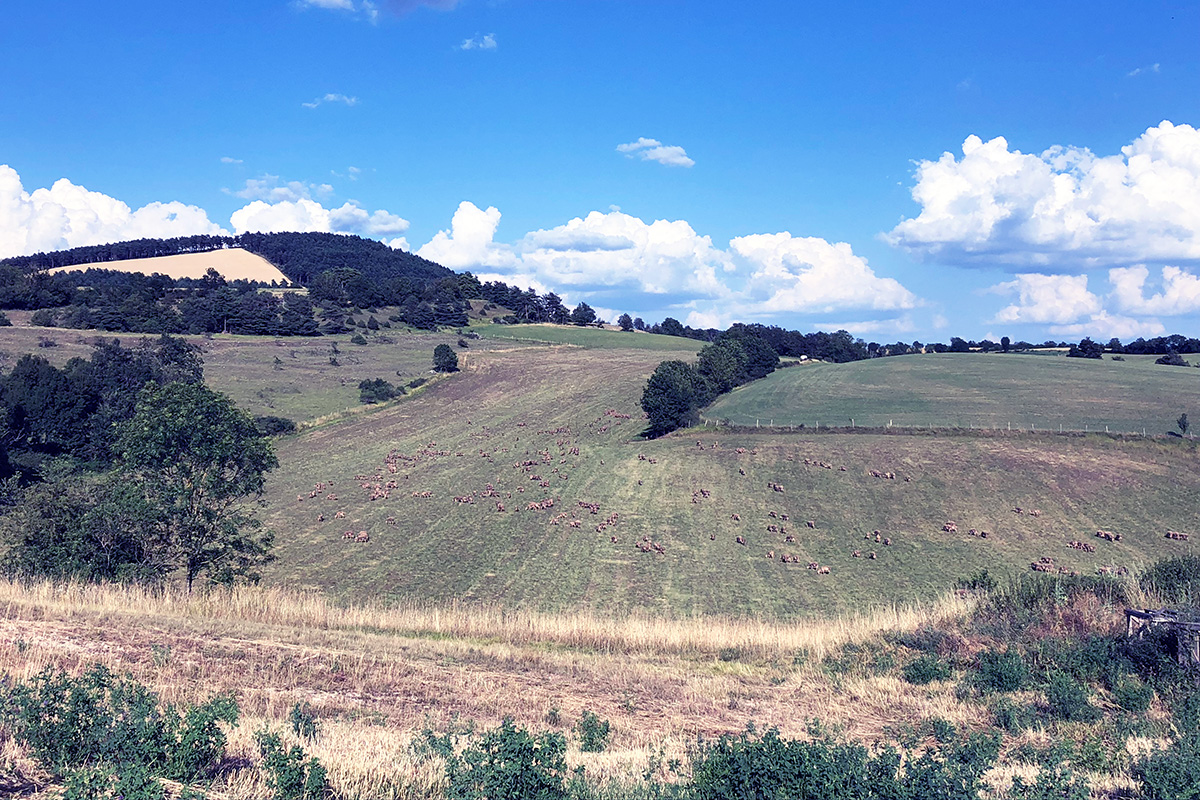Perched among the hills and plateaus of the Grands Causses outside Sévérac-le-Château in Southern France, the Ferme Seguin offers more than sweeping views of the surrounding countryside and a range of cheeses from the farm’s hundreds of sheep. In the summer, they also provide weekly guided tours in French, English, and Occitan—a minoritized Romance language of the region.
It was this last detail that compelled me to call Rémi Seguin, who runs the family farm with his brother Benoit. He told me that the Occitan tours originated in his love for the language, which he studied in school and could still speak “un petit peu” (in French, “a little bit”), as he put it. Occitan words remain in daily use on the farm, where local expressions relating to sheep raising, cheese making, and rural life often must be explained to interns who come from other regions.
Occitan is spoken by up to three million people across Southern France and parts of Italy, Catalonia, and Monaco. Although the language lacks any official status in France, Occitan has since the 1950s been recognized as one of the regional languages that may be offered as an elective subject in otherwise monolingual French public schools. Occitan literary and language movements have existed since the nineteenth century, representing one of the earliest cases of language revitalization in Europe.
There is value in Occitan as such a central dimension of the distinctive local culture and traditional industries, but Rémi also believes the language can convey certain ideas that would be too difficult in French. For him, speaking Occitan with visitors is a way of communicating “lo paratge e l’amistat”: while the latter can be translated as amitié (friendship or goodwill), the former has no direct equivalent in French. A term harkening back to the values of medieval Occitania, lo paratge remains a subject of much debate and mythologizing, but it is often described as encompassing concepts of honor, tolerance, chivalry, courtesy, and nobility. As Rémi explained, it extends beyond a French translation of simply “sharing” to transmitting knowledge and values.


This understanding of lo paratge e l’amistat became clear when I visited the farm during one of the soirées occitanes that Rémi and Benoit host every summer. Beginning with a tour of the farm, Rémi explained to the guests that they offered such visits because it is important for people to better understand both the work that goes into the creation of the products they buy and the lives of the individuals producing them. So while walking us through the farm, he interlaced explanations of advancements in sheep raising technologies with stories of past generations’ practices. He offered insights into the impact of technological changes on the lives of his family, bringing into vivid relief the human side of sheep raising and formatge (cheese) production.
After inviting guests to help herd the sheep up the hill to their grazing pastures, Rémi kicked off the second part of the evening: a homemade meal of locally sourced products, with local musicians playing Occitan music, all under the vaulted ceiling of a centuries-old barn restored by the Seguin family. He welcomed his guests in Occitan, explaining that “la lenga nòstra” (“our language”) is part of the linguistic heritage of the farm and Occitania. He wanted to share that heritage with all those gathered there that evening, just as they were sharing the “patrimoine de bâti” (“built heritage” in French) all around us. He recalled the family history of the farm, their agricultural endeavors through the decades and centuries.
Between this speech, the guided tour, and the family-style dining at long tables, the links between Rémi’s approach to using Occitan and hosting guests became clear. Linguistic, material, and familial heritage intertwined under the barn’s ancient vault—a true sense of lo paratge—as cheese boards were passed and conversation flowed in French, English, and bits of Occitan. Feasting on lamb and cheese while his visitors got to know each other and the musicians sang, Rémi explained to me that this atmosphere of conviviality—while sharing, understanding, and transmitting local heritage—was the essence of a soirée occitane.
In such a setting, he said, “on le fait revivre.” We make Occitan come alive again.

Sara Brennan is one of the principal researchers for the case study on Occitan in the Smithsonian’s Sustaining Minoritized Languages in Europe (SMiLE) project. She holds a PhD in critical sociolinguistics from Heriot-Watt University in Edinburgh and is now a research fellow at the Université Sorbonne Nouvelle and the LACITO CNRS research unit in Paris.
SMiLE Research Awards are sponsored by the Smithsonian Center for Folklife and Cultural Heritage with funding from Ferring Pharmaceuticals Inc.


